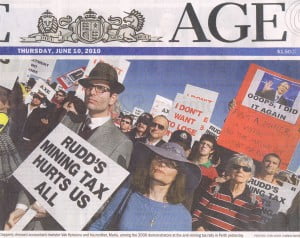
RSPT IS NOT SOME WEIRD TAX INVENTED BY KEN HENRY
During my time as valuer with the Australian Taxation Office I served a stint valuing hotels. Later, in the Commonwealth Bank, I came to value other forms of ‘going concerns’, such as service stations, nursing homes, restaurants, etc.
The methods used for hotels were to capitalise either the net rental or the net profit. If a tenant paid an ingoing for a lease, this premium was also rentalised over the term of the lease and added to the rent reserved under the lease.
Rentals obviously bore a relationship to the hotel’s turnover in liquor, meals and accommodation and to the net profit of the business. A capitalisation rate was established by analysis of sales of leased hotels trading at a similar turnover. I’d study the subject hotel’s profit and loss statements over the last few years and make adjustments for any non-recurrent items, trying to ascertain an explanation for any variations in trade during the period in question.
In the case of an owner-occupied hotel, I’d similarly analyse comparable sales evidence and examine the subject’s profit and loss accounts.
I found the net profit of owner-occupied hotels before interest and tax (EBIT) to be approximately double that of hotels where the business was operated by a tenant. If I added back the lessee’s rent, his EBIT plus rent usually equated to the EBIT of an owner-occupied hotel doing similar trade.
Over the years, I came to see this 50/50 approximation applied not only to the valuation of hotels, but to other businesses, including quarries.
Why shouldn’t it? The landlord has leased his freehold and business to a tenant on a partnership of some equality. The owner gets his 50% share of EBIT as rent, and the tenant receives his as business profit.
So, the Henry Review’s recommendations for a 40% Resource Super Profit Tax (RSPT) on mining has impeccable business credentials (even though the Rudd government has attached some minor, unnecessary considerations to it). The RSPT parallels what occurs in the business world except in the case of mining Australians are the landlords and the miners are the tenants. Australian miners should ReSPecT this relationship and pay the fair rent.
On the other hand, if miners like Clive Palmer, “Twiggy” Forrest and their representative Mitch Hooke want to say that their company tax on top of the proposed RSPT rent is too much, I’d have to agree. In this respect, they are in the same boat as most Australians who pay taxes on the incomes they’ve earned instead of a rent on the land they occupy.
The miners have the wrong end of the stick. We should all be paying our land or resource rents to the public purse, then work to have all arbitrary imposts and taxes removed.
Until Australians learn to appreciate the vast difference between a rent and a tax – and public debate on the issue demonstrates that politicians of all stripes clearly do not yet understand this difference – we’ll continue to have the sort of ridiculous arguments being put against the RSPT by the mining industry and other highly placed but ill-informed personages.
And I wish we’d stop calling it an RSPT or a miners’ “super profit”. It’s a trendy name for a natural resource rent, pure and simple. There are taxes and there are land rents: one can be passed on in prices and the other cannot.
In the meantime, we’ll continue to have a relatively few people steal much of the natural surplus that is our rent and inflate it up into bubbles, bringing on financial calamity every 18 years or so.
READING A CLASSICAL ECONOMICS FORMULA INTO A PROFIT AND LOSS STATEMENT
A connection I make between a classical economics equation – not found in current junk economics textbooks – and profit and loss statement may serve to reinforce the point that the RSPT is fair and appropriate. Australia needs it.
Classical economists observed that production (after costs are deducted) was the sum of land rent, wages and interest:
P = R + W + I
Note here that ‘interest’ is not used in the sense of financial interest but in the classical sense of ‘interest’ being the return on capital. Along with other classical economists, the American social philosopher Henry George observed that, of these three income forms, rent is the only one that isn’t created by labour or capital. Being generated by public factors alone, it is indeed a surplus in the production process.
So George tweaked the formula to:
P – R = W + I
to show that if rent is captured to the public purse, it becomes unnecessary to tax ( fine?) wages and capital. He further observed that real wages and returns to capital can’t increase in the medium to long term unless rent is captured for necessary government and is not privatised by companies or individuals (where the latter necessitates the introduction of production-distorting taxes).
This explains why poverty persists and why real prosperity continues to elude us, even though innovation and production techniques improve geometrically. The vast increases in wealth simply flow directly to those who have privatised the public’s land rents.
The formula works either at the national level or in an individual business, so let’s marry it to a profit and loss statement:-
PRODUCTION = $ z
less costs:
$a, $b, $c, $interest , $WAGES, $taxation = Net Profit
add back:
$interest (because we’re not interested in debt to equity arrangements) and $taxation = EBIT (i.e. RENT + INTEREST; remember, the latter ‘interest’ is in the classical sense of return on capital).
For extractive industries, divide EBIT by 2 = (Australians’) RENT and (miners’ return on capital) INTEREST.
As I’ve shown above, this applies in similar ‘going concern’ business arrangements.
Although the land rent for other non-going concern commercial or industrial enterprises is also be found within the EBIT, it will be much less than 50% in those cases, and will be picked up best by land value-based revenues on real estate titles.
European proposals to tax banks’ “super profits” in the same way as resource extraction is misguided. Exorbitant flows of excessive rent to banks via interest charges would be curtailed quite nicely by capturing title-based land rents.
So, give us a break on the government’s 40% RSPT, won’t you please, miners? You’re wrong. Why don’t you instead just zero in on eliminating company taxes and income taxes? We’re all in the same boat with you on that one, and might even join you in trying to get rid of those.
_____________________________________________________
Postscripts:
1. Maybe I’m a little tough on economists, because there are still a few who can see the great possibilities of resource rents.
2. The Australian e-journal Online Opinion published my blog on RSPT mining tax today (3 June). If you have any thoughts on the RSPT why not add a comment, or respond to other comments on the article? Self-serving arguments being put by the miners demand a response.
3. On second thoughts, maybe the miners ARE having to downsize:-



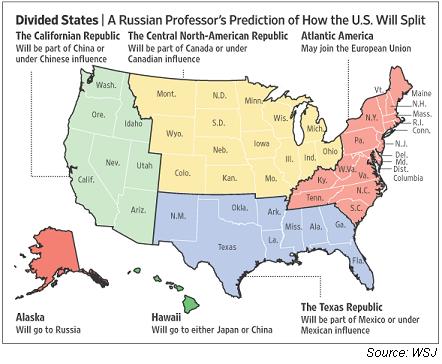
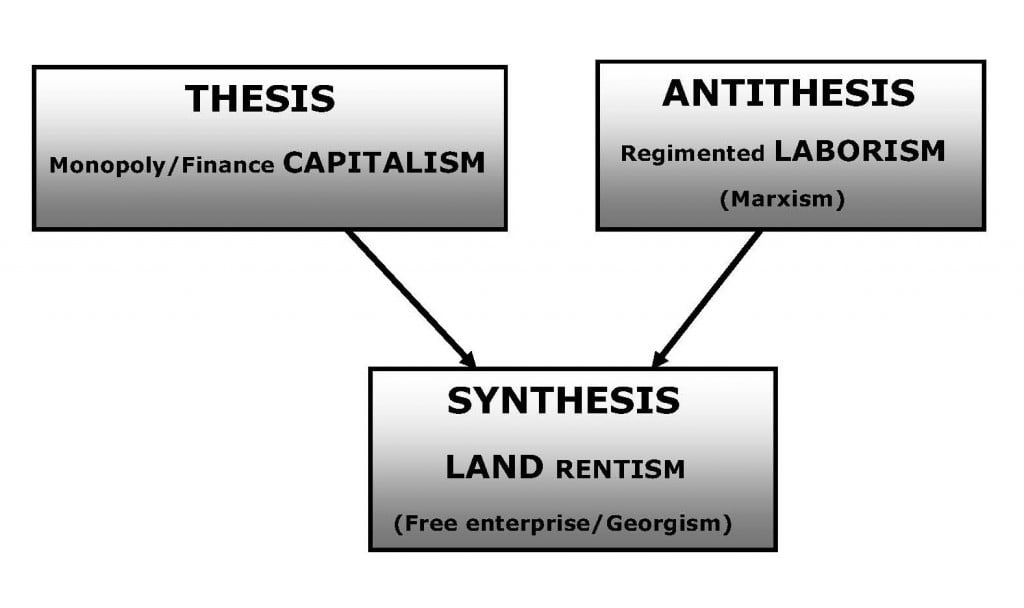
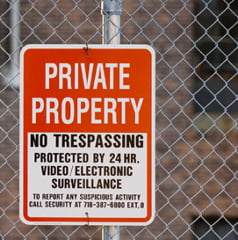 THE WORLD’S GREATEST HOAX
THE WORLD’S GREATEST HOAX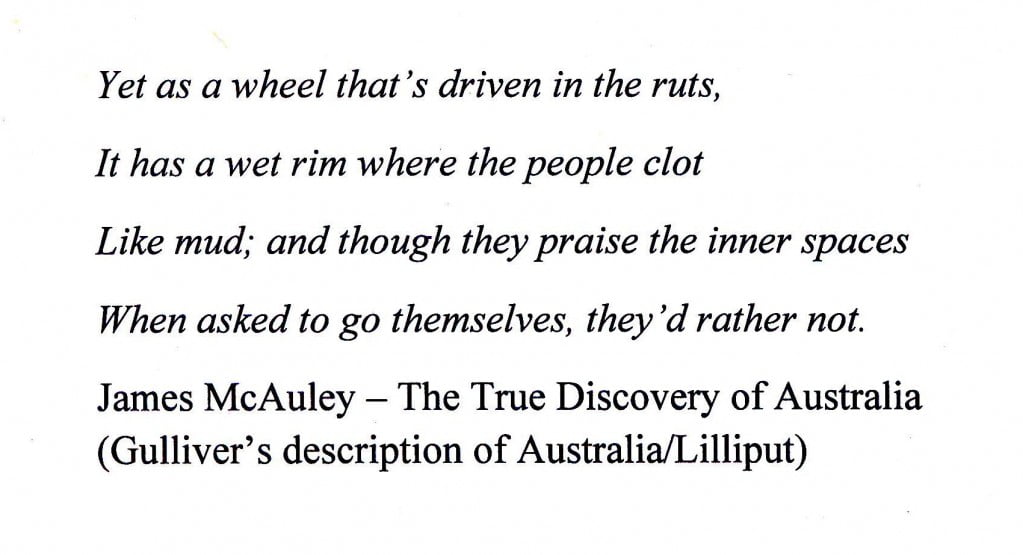


 My thanks to those who visit this site regularly. Newcomers who can’t review everything that’s gone before might appreciate a summary:-
My thanks to those who visit this site regularly. Newcomers who can’t review everything that’s gone before might appreciate a summary:-
